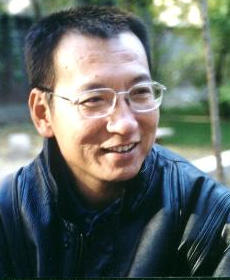Nobel Prize for 刘晓波, Liu Xiaobo

Unfortunately this is likely to be last time for the next 12 hours or so that I will be near a computer. So for the moment this is yet another placeholder to note that the award of the Nobel Peace Prize to Liu Xiaobo, who was sentenced last December 25 to 11 years in prison for "subversion" (see mention at the time here) is very significant, and will have far more lasting consequences than the selection of last year's winner. Last year's choice (Obama) was thought to be "controversial." That was nothing. Liu was jailed, remember, largely for his role in promoting "Charter 08," a movement for the broadening and liberalizing of civil society in China. Eg: "Without freedom, China will always remain far from civilized ideals." It was consciously modeled on "Charter 77" in Soviet-era Czechoslovakia and similar peaceful movements against Communist control. Vaclev Havel of Charter 77 is among those who have pleaded on Liu's behalf. Charter 08 came out during the Olympic year, while the Chinese government was welcoming in the world to see its achievements and maturity. Nothing happened to Liu (or the several hundred other intellectuals, lawyers, etc who initially and bravely signed the statement) for a while. A few months after the Olympics ended, Liu was taken off by the police -- and then given his long sentence late last year.
That is all for this moment. It is a big decision. I hope that in the very short term its effects on Liu and his family are not even more retribution; and that in the long historical perspective this will be seen as a step toward the eventual liberalization of China, as Charter 77 was for Communist Europe. It is absolutely certain that in the very short run the Chinese government will view this as an infuriating and insulting intrusion into its "internal affairs," and perhaps even "hurting the feelings of the Chinese people." (Think of the backlash within the United States by opponents of Martin Luther King, Al Gore, and Barack Obama, respectively to their Nobel Peace Prizes -- and then increase that by several orders of magnitude.) The part of the Charter 77 analogy the Chinese government of course concentrates on and is determined to resist is the eventual downfall of the Communist regimes in the Soviet sphere. China's situation is very different -- its economic system "works," as the Soviet model clearly did not. In theory the steady expansion of liberties and civil society need not be a mortal threat to governmental authority in China (in hundreds of ways the country is far more liberal than it was 30 years ago), but in Liu's case and others the government has acted as if it were.
There will be much to discuss over the months and years. For this moment, admiration for the courage, sacrifice, and endurance of Liu and the countless other Chinese people who have worked for a more liberal and mature society, and respects to the Nobel committee for a brave choice.